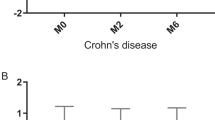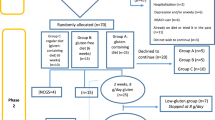Abstract
Background/Objectives:
Chronic conditions impair perception of well-being. Malabsorption of lactose is the most frequent form of malabsorption and manifests as lactose intolerance. There is a lack of information regarding their impact on self-perception of health. The objective of this study is to determine the subjective impact of self-reported lactose intolerance or objective lactose malabsorption on patient health by using a patient-reported outcome to measure health-related quality of life (HRQOL) and modification of lactose-containing food diet.
Subjects/Methods:
A 3-year prospective, cross-sectional study was performed in patients referred for a lactose hydrogen breath test. Patients were asked about their subjective opinion relative to their lactose tolerance and completed a validated, specific questionnaire to determine symptoms of intolerance during habitual consumption of dairy. A 50-g lactose breath test was then performed. Patients were grouped as absorbers vs malabsorbers and tolerant vs intolerants.
Results:
A total of 580 patients were included (median age 30 years, 419 female). Overall, 324 patients (56%) considered themselves lactose intolerant and that perception was associated with avoidance of dairy consumption (55% vs only 9% of self-defined tolerants). Self-perception of intolerance was associated with lower HRQOL scores (median, 60 vs 70, P<0.01). In contrast, lactose objective malabsorption was not clearly associated with dairy avoidance (41% of malabsorbers avoided dairy vs 31% of absorbers). However, HRQOL scores were also significantly lower in malabsorbers than in absorbers (60 vs 70 respectively, P<0.001).
Conclusions:
Subjective perception of lactose intolerance affects the decision to avoid dairy even more than objective malabsorption. However, both self-perception of lactose intolerance and objective lactose malabsorption are associated with poorer perceived quality of life.
This is a preview of subscription content, access via your institution
Access options
Subscribe to this journal
Receive 12 print issues and online access
$259.00 per year
only $21.58 per issue
Buy this article
- Purchase on Springer Link
- Instant access to full article PDF
Prices may be subject to local taxes which are calculated during checkout




Similar content being viewed by others
References
Casellas F, Aparici A, Casaus M, Rodríguez P . Self-perceived lactose intolerance and lactose breath test in elderly. Eur Geriatr Med 2013; 4: 372–375.
EFSA Panel on Dietetic Products, Nutrition and Allergies (NDA). Scientific Opinion on lactose thresholds in lactose intolerance and galactosaemia. EFSA J 2010; 8: 1777.
Argüelles-Arias F, Rodríguez Ledo P, Tenías JM, Otero M, Casellas F, Blay Cortés G et al. The management of lactose intolerance among primary care physicians and its correlation with management by gastroenterologists: the SEPD-SEMG national survey. Rev Esp Enferm Dig 2015; 107: 554–558.
Iqbal TH, Bradley R, Reilly HM, Lewis KO, Cooper BT . Small intestinal lactase status, frequency distribution of enzyme activity and milk intake in a multi-ethnic population. Clin Nutr 1996; 15: 297–302.
Gupta SK, Chong SKF, Fitzgerald JF . Disaccharidase activities in children: normal values and comparison based on symptoms and histologic changes. J Pediatr Gastroenterol Nutr 1999; 28: 246–251.
Suarez FL, Savaiano DA, Levitt MD . A comparison of symptoms after the consumption of milk or lactose-hydrolyzed milk by people with self-reported severe lactose intolerance. N Engl J Med 1995; 333: 1–4.
Casellas F, Aparici A, Casaus M, Rodríguez P, Malagelada JR . Subjective perception of lactose intolerance does not always indicate lactose malabsorption. Clin Gastroenterol Hepatol 2010; 8: 581–586.
Barr SI . Perceived lactose intolerance in adult Canadians: a national survey. Appl Physiol Nutr Metab 2013; 38: 830–835.
Keith JN, Nicholls J, Reed A, Kafer K, Miller GD . The prevalence of self-reported lactose intolerance and the consumption of dairy foods among African American adults are less than expected. J Natl Med Assoc 2011; 103: 36–45.
Birge SJ Jr, Keutmann HT, Cuatrecasas P, Whedon GD . Osteoporosis, intestinal lactase deficiency and low dietary calcium intake. N Engl J Med 1967; 276: 445–448.
Jackson KA, Savaiano DA . Lactose maldigestion, calcium intake and osteoporosis in African-, Asian-, and Hispanic-Americans. J Am Coll Nutr 2001; 20: 198S–207S.
Dainese R, Casellas F, Mariné-Barjoan E, Vivinus-Nébot M, Schneider SM, Hébuterne X et al. Perception of lactose intolerance in irritable bowel syndrome patients. Eur J GastroenterolHepatol 2014; 26: 1167–1175.
Tomba C, Baldassarri A, Coletta M, Cesana BM, Basilisco G . Is the subjective perception of lactose intolerance influenced by the psychological profile? Aliment Pharmacol Ther 2012; 36: 660–669.
Zheng X, Chu H, Cong Y, Deng Y, Long Y, Zhu Y et al. Self-reported lactose intolerance in clinic patients with functional gastrointestinal symptoms: prevalence, risk factors, and impact on food choices. Neurogastroenterol Motil 2015; 27: 1138–1146.
Casellas F, Malagelada JR . Applicability of short hydrogen breath test for screening of lactose malabsorption. Dig Dis Sci 2003; 48: 1333–1338.
Peuhkuri K, Vapaatalo H, Nevala R, Korpela R . Temperature of a test solution influences abdominal symptoms in lactose tolerance tests. Scand J Clin Lab Invest 2000; 60: 75–80.
Casellas F, Varela E, Aparici A, Casaus M, Rodríguez P . Development, validation and applicability of a symptoms questionnaire for lactose malabsorption screening. Dig Dis Sci 2009; 54: 1059–1065.
Badia W . Transcultural adaptation of health related quality of life measures for its use in Spain. Med Clin 1995; 105: 56–58.
Yang JF, Fox M, Chu H, Zheng X, Long YQ, Pohl D et al. Four-sample lactose hydrogen breath test for diagnosis of lactose malabsorption in irritable bowel syndrome patients with diarrhea. World J Gastroenterol 2015; 21: 7563–7570.
Yang J, Deng Y, Chu H, Cong Y, Zhao J, Pohl D et al. Prevalence and presentation of lactose intolerance and effects on dairy product intake in healthy subjects and patients with irritable bowel syndrome. Clin Gastroenterol Hepatol 2013; 11: 262–268.
Yang J, Fox M, Cong Y, Chu H, Zheng X, Long Y et al. Lactose intolerance in irritable bowel syndrome patients with diarrhoea: the roles of anxiety, activation of the innate mucosal immune system and visceral sensitivity. Aliment Pharmacol Ther 2014; 39: 302–311.
Petschow B, Doré J, Hibberd P, Dinan T, Reid G, Blaser M et al. Probiotics, prebiotics, and the host microbiome: the science of translation. Ann NY Acad Sci 2013; 1306: 1–17.
He T, Venema K, Priebe MG, Welling GW, Brummer RJ, Vonk RJ . The role of colonic metabolism in lactose intolerance. Eur J Clin Invest 2008; 38: 541–547.
Author information
Authors and Affiliations
Corresponding author
Ethics declarations
Competing interests
The authors declare no conflict of interest.
Additional information
Author contributions
FC contributed to study concept and design; acquisition of data; analysis and interpretation of data; and drafting of the manuscript. AA, MJP and PR contributed to acquisition of data.
Rights and permissions
About this article
Cite this article
Casellas, F., Aparici, A., Pérez, M. et al. Perception of lactose intolerance impairs health-related quality of life. Eur J Clin Nutr 70, 1068–1072 (2016). https://doi.org/10.1038/ejcn.2016.80
Received:
Revised:
Accepted:
Published:
Issue Date:
DOI: https://doi.org/10.1038/ejcn.2016.80
This article is cited by
-
Real-time PCR based detection of the lactase non-persistence associated genetic variant LCT-13910C>T directly from whole blood
Molecular Biology Reports (2019)
-
Does primary lactase deficiency reduce bone mineral density in postmenopausal women? A systematic review and meta-analysis
Osteoporosis International (2018)
-
Lactase Non-persistence and Lactose Intolerance
Current Gastroenterology Reports (2017)



